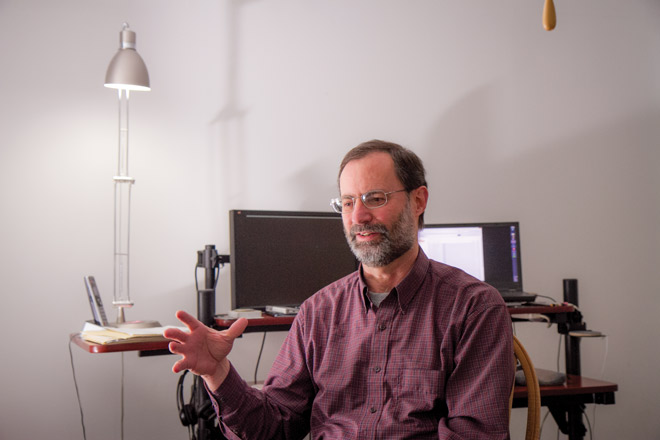
Philip Horst ’76 centers his small company, Integral Design Software, on the values of environmental stewardship, a holistic approach to spirituality, and improving others’ quality of life.
Starting in refugee camps
Philip Borkholder’s ’89 journey to information technology began by majoring in fields that had little to do with computer science: biology and international agricultural development.
This led to a five-year stint with Mennonite Central Committee (MCC) shortly after graduation in 1989. Borkholder spent one year in Honduras and four in El Salvador, where he handled computer matters in refugee camps.
Teaching himself from books with help from a local university professor, Borkholder converted information stored in gunny sacks and written on cardboard boxes into electronic files. Through his work, food distribution and peace negotiations became more reliable.
After returning to the States, Borkholder wryly noted that “MCC ruins you” in that he didn’t want to settle into working for the typical employer. After cycling through two employee roles, he became an independent, self-employed software developer. Never foreseeing himself in this field as a young man, Borkholder says that each step along the way has opened another door towards his career.
Borkholder encourages those interested in starting a business to “just go for it!”
Supporting humanitarian programs
Like Philip Borkholder, Philip Horst ’76 – who is president and chief technology officer of Integral Design Software – has spent time with Mennonite Central Committee. He says that his “career choices have been shaped by values that are rooted in significant ways from my time at then-EMC.”
Those values include environmental stewardship, a holistic approach to spirituality, and improving others’ quality of life. Integral Design Software applies these values by serving organizations that offer international relief and development programs. For example, their program “PlanWin” manages data for humanitarian programs to better organize, communicate and fundraise.
Horst founded the company in 2008. The staff consists of himself, his son, and a few others doing contract work. The small scale of the operation means Horst does “everything and anything that needs to be done,” even when this includes new challenges and skills. “I can learn whatever I need in order to do my work,” says Horst.
Horst encourages potential entrepreneurs to have foresight: “I would say to be prepared to be always on, both in terms of responsibility and needing to get things done. Realize you probably can’t really anticipate what’s ahead. Find some key people you can trust and collaborate with, even if it is informally. And think a second time if you really want to do this – then have fun.”
Turning school experience into business
In 1986, Paul Shelly ‘89 and Kevin Baer ‘90 lived on the first floor of the Oakwood dorm. Their friends group remained close post-college, gathering for yearly golf trips. This friendship laid the groundwork for what would later become Educational Leadership Solutions.

Paul Shelly (left) and Kevin Baer first got to know each other living on the first floor of Oakwood dormitory. They then shared a house in Meridian, Mississippi. Now they live 900 miles from each other, but share ownership of a business, Educational Software Solutions.
For Shelly, information technology is his second career. His first was being a public school educator. After graduating from EMU, he and wife Lisa Zendt Shelly (also an ’89 grad) moved to Meridian, Mississippi, where he was a public school educator for eight years.
Similarly, Baer spent his first three years after graduation working in Meridian, living in an intentional community (a shared house) with Shelly and three others. They attended Jubilee Mennonite Church, then pastored by J. Daryl Byler, now an administrator at EMU.
Shelly and his family later moved a couple of hours north to the Tupelo Public School District, where he was named the 2003 “Administrator of the Year.”
Shelly’s education career “coincided with technology becoming part of the classroom, giving me a chance to become an ‘expert’ as technology progressed,” he explains. As an administrator, Shelly wanted to streamline curriculum planning and student assessment in a customizable way.
In the early 2000s, Shelly contacted Baer for technical advice on installing and distributing software for other school administrators. “This contact was the starting point for the living room-based endeavor that within about a year turned into ELS,” says Baer, who now functions as the company’s Chief Technology Officer. The company now has software in over 90% of Mississippi’s school districts.
Problem solving, rather than entrepreneurship, is what drove the two to start ELS. “Business never had any appeal to me while in college,” Shelly says. “If I remember correctly, I think I got a C in the only business course I ever took. But I have always enjoyed building things and figuring out shortcuts.”
While Baer had a business administration minor with his computer science major, he too did not intend to become an entrepreneur. Instead, Baer says that professionals should always be on the lookout for ways to improve their output, which could become “the seed for a service or product that some day becomes the core of a business.”
In an arena where change occurs quickly, an adaptive mind is necessary. “A business like ours seems like it is always one year away from extinction if we make the wrong guess as to what the next trend will be,” says Shelly.
In light of such a cutthroat field, Baer measures their success based on “how pleased and satisfied our customers are with how they interact with our software and services.” He is rewarded by the absence of bureaucracy, and the flexibility for developers to develop and decide software function rather than “tending to process and procedures.” On that note of creative freedom, Baer advises aspiring enterprisers to “not be afraid of trying something new when opportunities arise.”